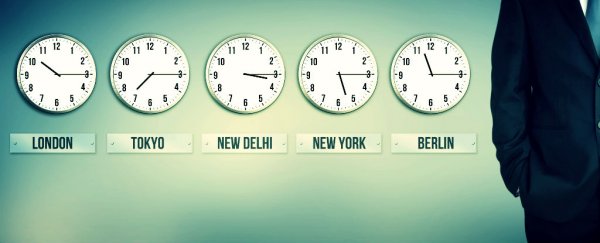It's a question that might have crossed your mind while you're whiling away the hours on a long-haul flight: how necessary are time zones anyway? And what would happen if it was always the same time at every point on Earth?
Time zones are obviously a very modern phenomenon: before everyone was connected to everyone else (via telephone lines and then the Internet), it didn't really matter if your own local time bore any resemblance to a city on the other side of the world.
A standard time was first adopted in Britain by the railway operators in 1847; this was quickly followed by a standard time zone in New Zealand (11 hours and 30 minutes ahead of Greenwich Meridian Time) in 1868, and the introduction of five time zones in the US in 1883.
As Adele Peters at Fast Company explains, in both the US and the UK, it was the railway companies that helped introduce the concept of a standard, nation-wide time that changed with longitude - the need to keep trains running on time and have timetables that everyone could refer to accurately was one of the major catalysts behind the introduction of time zones.
By 1929, most countries had a time zone offset from GMT to some degree, but Nepal - the last hold-out from the system - didn't join the club until 1986.
Fast-forward to now: are timezones still needed in an ultra-connected world? Economist Steve Hanke and astronomer Dick Henry have been very vocal in proposing an end to time zones - something they would replace with a system aptly named the Hanke-Henry Date and Time. After all, they argue, from a physics standpoint, it's always the same time everywhere in the world.
In the plan put forward by Hanke and Henry, 9am would be 9am across the world. However, some people would know 9am as bedtime, while others would see it as the start of the working day.
For example, if you were making a conference call to the other side of the planet, you'd have to work out what people usually do at 9am in their part of the world, rather than make any hourly calculations. It would be called Universal Time.
Hanke-Henry Date and Time would make life easier for businesses, countries, and airlines, say its inventors. The calendar would be identical every year, except for a one week-long 'mini-month' at the end of December every five or six years - this would bring the calendar back into sync with seasonal changes.
Your birthday is always on the same day, and Christmas Day is always on a Monday. What's more, Daylight Saving Time disappears completely.
Months and year quarters would be more uniform, making accounting and financial practises more straightforward, say Hanke and Henry. The pair want to see the new calendar adopted by 2018 - which might be just a little ambitious - and are relying on social media to spread the word.
But considering the upheaval such a proposal would mean, it's likely that you'll have to put up with time zones for a good while yet.
